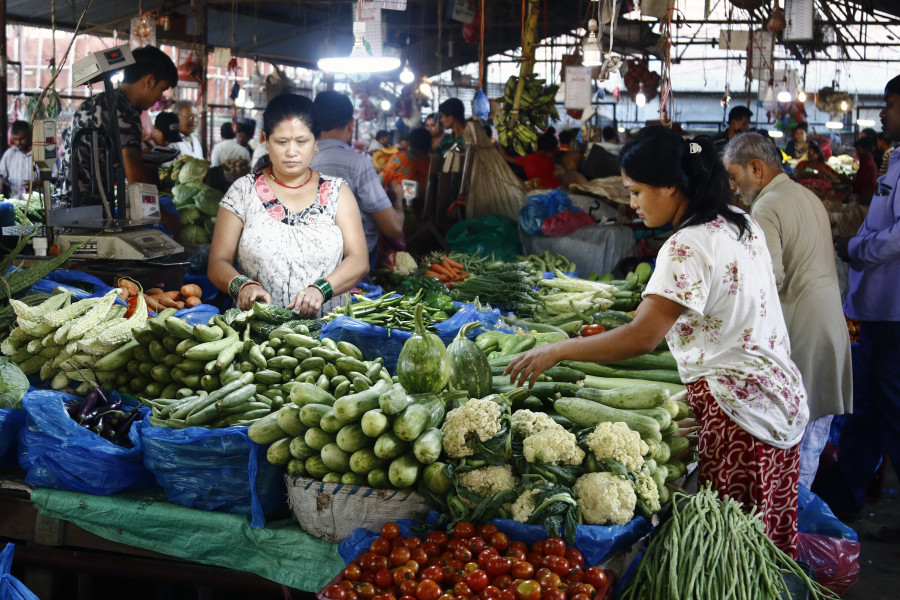Money
Vegetable prices continue to soar in Kathmandu amid inadequate supply
Consumer rights activists blame traders for the artificial price hike.
Krishana Prasain
Vegetable prices in the Kathmandu Valley show no sign of cooling despite the end of the festive season.
The price of vegetables started increasing from July after majority of farmers shifted their focus to paddy plantation. Traders had forecast that prices would come down after the monsoon and festive season but it didn’t happen.
Binaya Shrestha, deputy general manager at the Kalimati Fruits and Vegetables Market Development Board, said that prices have gone up drastically as a result of low supply against the burgeoning demand for fresh vegetables.
“Nowadays, we are receiving less than 300 tonnes of vegetables daily. The demand for fresh vegetables in the Valley is nearly 800 tonnes a day,” he said.
After the Tihar festival that ended on Tuesday, the retail prices of most vegetables have spiked by up to 73 percent. Consumer rights activists say that it was an artificial price hike created by traders on the pretext of lower supply and production.
The prices of vegetables such as tomato big, small, potato, onion, cauli local, french beans, bitter gourd, bottle gourd, pointed gourd, okara have increased by up to 73 percent.
The price of essential vegetables has gone up by more than Rs100 per kg.
Both tomato big and small have become dearer by Rs125-165, a jump of 66 to 73 percent within a week.
Cauli local price has increased by 16 percent now costs Rs145 per kg while french bean is priced at Rs105 per kg, an increment of 40 percent within a week. Likewise, pointed gourd has reached Rs125 per kg, a hike of 31 percent while okara saw a jump of 31 percent to retail at Rs125 per kg.
While vegetables like eggplant and squash have seen their prices drop, it still costs more than Rs80-90 per kg. Similarly, the price of potato red has reached Rs75 per kg while cabbage local costs Rs65 per kg.
The October-November period is the major vegetable producing months, particularly in the Tarai region. However, Kathmandu’s key wholesale market — Kalimati Fruits and Vegetables Market Development Board — said the supply side has not improved.
Prem Lal Maharjan, president of the Forum for Protection of Consumer Rights, said that the local level governments have been entrusted with the responsibility to conduct market inspections but they were not doing their job. “As a result, opportunist traders are profiting from the lack of inspections.”
According to him, the farmgate price of most of the vegetables is Rs25-30 per kg. “But when it arrives in Kathmandu it increases manifold,” he said.
During the market inspections conducted at vegetable markets in Kalimati and Balkhu by the Department of Commerce, Supply and Consumer Protection Management, it was discovered that traders were selling vegetables without issuing a sales bill, which the government has made mandatory last year, to check sales prices.
The average price of vegetables started inclining from July which traders claimed was due to natural calamities. Similarly, prices increased by up to 66 percent in September where officials at the vegetable market said was due to the involvement of unscrupulous traders despite adequate supply. Vegetable prices jumped by 34 percent in October again.
Resham Tamang, administrator at Balkhu Fruits and Vegetables Market, said local farmers who used to send 10-15 doko (basket made of bamboo) are now sending 3-4 doko of vegetables, due to low production. “The prices are not expected to fall anytime soon,” he added.
According to import data of the Nepal Rastra Bank, the country imported vegetables worth Rs2.7 billion during the mid-July to mid-September period of the current fiscal year, up 15 percent as compared to the same period in the last fiscal year.




 9.83°C Kathmandu
9.83°C Kathmandu















